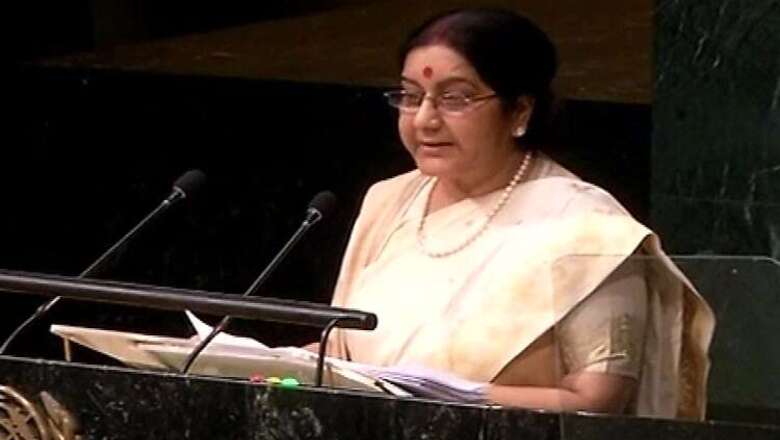
views
Statement by Honourable External Affairs Minister, Mrs. Sushma Swaraj at the general debate of the 70th session of the United Nations General Assembly.
OCTOBER 2, 2015
Mr, President,
The United Nations is completing 70 years this year. Therefore, this General Assembly is historic. I congratulate you on behalf of the Prime Minister and people of India as well as on my own behalf for assuming the responsibilities of the post of the President of this historic General Assembly. I hope that this year will also be historic for the United Nations from the perspective of outcomes. I would like to assure you that you will get India's full support in your efforts.
Mr. President,
70 years ago the foundation of the United Nations was laid on the western shores of this country through the San Francisco Charter. India was one of the countries which signed the Charter although we were not independent at that time. We got our independence two years later. When the United Nations was established, a rather diminutive looking man with the powerful weapon of non-violence was writing out the final act in a struggle that would be a symbol of hope for the colonized and the oppressed everywhere.
I am grateful that the United Nations has declared the day this extraordinary man was born as the International Day of Non-Violence. It is a pleasant coincidence that we will be celebrating this day tomorrow. Gandhiji had said, "The difference between what we do and what we are capable of doing would suffice to solve most of the world's problems". This message of his fits most appropriately in the context of the United Nations.
Mr. President,
In the life of any human being the 7oth year is a milestone where one can look back to reflect as to what one has achieved and what one has lost. Similarly, for people ass,elated with an institution the 70± year gives an opportunity to analyse whether the institution has been able to fulfill the purpose for which it was formed, and whether it has been able to achieve the goals for which it was established. Today all of us need to ask ourselves whether we have been able to fulfill the purpose and achieve the goals for which the United Nations was established 70 years ago. When I ask this question to myself, I get an answer in the affirmative for some questions and in the negative for some. For example, United Nations has been successful in preventing a third world war, in assisting decolonization and dismantling apartheid, in combating global epidemics and reducing global hunger, and in promoting democracy and human rights.
Yet, when we ask ourselves whether we have been able to prevent conflicts taking place in several parts of the world, the answer is no. If we ask whether we were able to find permanent solution to these conflicts, the answer is no. If we ask whether we were able to show the path of peace to a world which is going on the way of violence, the answer is no. On these parameters, the United Nations appears as an ineffective institution in the area of international peace and security. It has failed to effectively address the new challenges to international peace and security.
Mr. President,
Today, the world is ravaged by war in three continents with the Security Council being unable or unwilling to stanch the flow of blood. Traditional solutions that emphasize force have only proven to exacerbate problems. We must ask ourselves if we have the political will to craft alternatives to conflict and to pursue them with commitment and single-minded dedication.
Nowhere is such a goal more important than in the peacekeeping process Under the blue flag, several men and women are constantly working to prevent conflict, protect civilians and sustain peace processes. With 18o,ooo peacekeepers deployed so far, India has been the largest provider of international security by the UN. Even today, about 8000 Indian military and police personnel are participating in lO Missions, operating in highly challenging environments.
India remains committed to continue supporting the UN Peacekeeping Operations and even enhance our contributions, as announced by our Prime Minister at the Leaders' Summit on Peacekeeping. Our new 2 contributions will cover all aspects of peacekeeping - personnel, enablers and training.
At the same time, it is necessary that there be no dilution of the cardinal principles of peaeekeeping. It is a matter of concern that there is no role of troop contributing countries in the formulation of mandates, which are often amended without consultations. This is a clear violation of Article 44 of the UN Charter. It has also been our view that peaeekeeping operations cannot substitute for political solutions. This has been underscored by the Horta Panel as well. As we mark the 7oth anniversary of the UN, I take the opportunity to pay tribute to more than 3,3oo peaeekeepers including 161 from India who have made the ultimate sacrifice. We stand ready to contribute to the Peaeekeepers Memorial Wall, which has been approved by the 69th General Assembly.
The safety of our peacekeepers, the security of our nations, indeed the future of the international community itself is now dependent on how we respond to the greatest threat that we face today: terrorism. A threat that India has lived with for more than a quarter of a century was tragically brought home to this very city in the autumn of 2ool. Since then, the proliferation of terrorist acts, the rise of extremist ideologies, and the impunity of states that back it have not been adequately countered.
International terrorism can only be defeated by organized international action. The world must demonstrate that it has zero tolerance for terrorists who kill and maim inn.cent civilians with action based on the principle of prosecute or extradite. Countries that provide financing to terrorists and safe havens for their training, arming and operations must be made to pay a heavy price by the international community.
Equally importantly, an international legal regime, under the Comprehensive Convention on International Terrorism can no longer be held up. 19 years ago, in 1996, India had made this proposal at the United Nations but we have been unable to adopt it and entangled ourselves in the issue of definition. We have to understand that there can be no distinction between good and bad terrorists. Neither can terrorism be linked to any religion. A terrorist is a terrorist; one who commits crimes against humanity cannot have any religion. Therefore, my appeal to all of you is that we should come together in this 7oth anniversary year of the United Nations and pledge to unanimously adopt the CCIT.
While on the subject of terrorism, I take the opportunity to share the challenges that we face in our ties with Pakistan. None of us can accept that terrorism is a legitimate instrument of statecraft. The world shared our outrage at the 2008 Mumbai terror attacks in which citizens of many nations were helplessly butchered. That the mastermind behind the attack is walking free is an affront to the entire international community. Not only have past assurances in this regard not been honoured but new cross- border terrorist attacks have taken place recently, in which two terrorists from across the border have also been captured alive. We all know that
these attacks are meant to destabilize India and legitimize Pakistan's illegal occupation of parts of the Indian State of Jammu and Kashmir and its claim on the rest of it.
Let me use this occasion to spell out our approach clearly. India remains open to dialogue. But talks and terror cannot go together. Yesterday the Prime Minister of Pakistan proposed what he termed as a four-point new peace initiative. I would like to respond. We do not need four points, we need just one - give up terrorism and let us sit down and talk. This was precisely what was discussed and decided by the two Prime Ministers at Ufa this July. Let us hold talks at the level of NSAs on all issues connected to terrorism and an early meeting of our Directors General of Military Operations to address the situation on the border. If the response is serious and credible, India is prepared to address all outstanding issues through a bilateral dialogue.
Mr. President,
Even as we counter the menace of terrorism, we must acknowledge that real social and economic progress remains a critical goal. The elimination of basic human want leads almost invariably to more peaceful societies, as is evidenced by a map of the conflicts that engulf parts of the world.










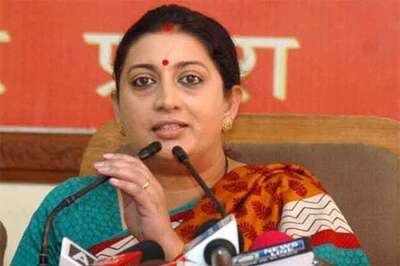
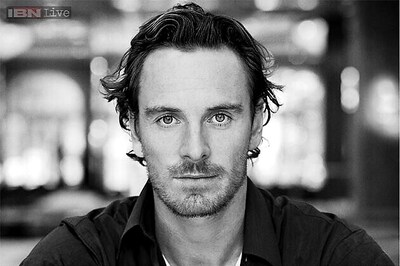
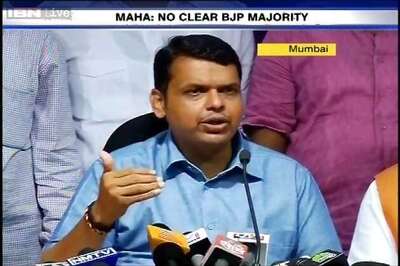
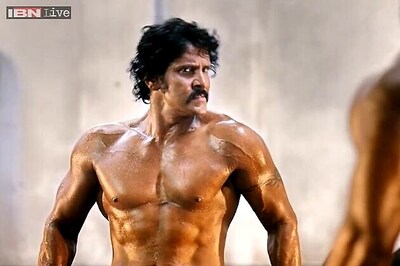
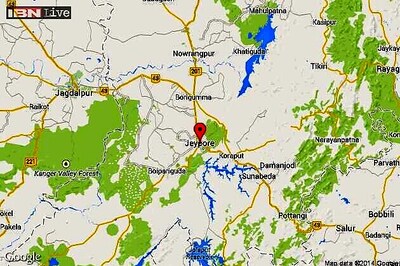
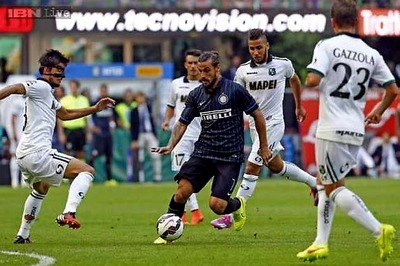

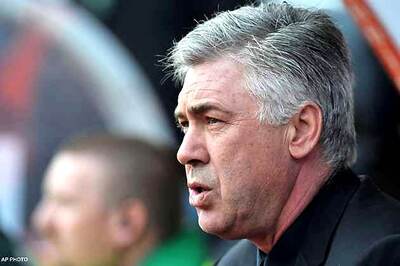
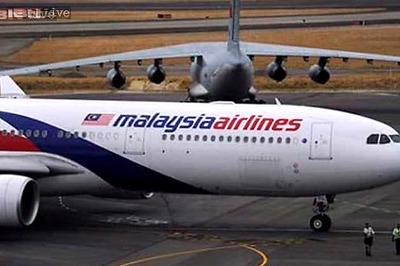

Comments
0 comment